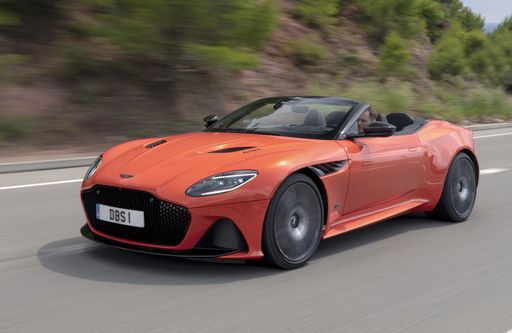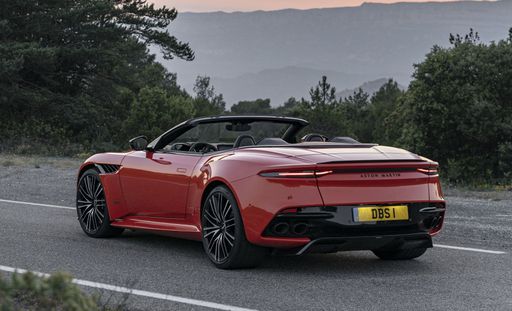Aston Martin DBS Superleggera Convertible VS Citroen Jumper
Aston Martin DBS Superleggera Convertible
The Aston Martin DBS Superleggera Cabrio epitomises the perfect blend of luxurious elegance and high-performance engineering. With its sleek and aerodynamic design, this convertible offers an exhilarating open-top driving experience that is both powerful and refined. The meticulously crafted interior combines premium materials with advanced technology, providing both driver and passengers with an atmosphere of sophistication and comfort.
more informationCitroen Jumper
The Citroen Jumper impresses with its robust design and exceptional versatility, making it a popular choice for both business and leisure purposes. Its spacious interior is thoughtfully designed to maximise comfort and practicality, providing ample room for passengers and cargo alike. With a smooth driving experience and a range of advanced safety features, the Jumper is well-equipped to handle the demands of modern motoring.
more information @ media.astonmartin.com
@ media.astonmartin.com
 @ media.astonmartin.com
@ media.astonmartin.com
Costs and Consumption |
|
|---|---|
|
Price
about 328300
£
|
Price
about 55900 - 58700
£
|
|
Consumption L/100km
13.5
L
|
Consumption L/100km
-
|
|
Consumption kWh/100km
-
|
Consumption kWh/100km
26.2
kWh
|
|
Electric Range
-
|
Electric Range
424
km
|
|
Battery Capacity
-
|
Battery Capacity
97.8
kWh
|
|
co2
314
g/km
|
co2
0
g/km
|
|
Fuel tank capacity
75
L
|
Fuel tank capacity
-
|
Dimensions and Body |
|
|
Body Type
Convertible
|
Body Type
Cargo Van
|
|
Seats
4
|
Seats
3
|
|
Doors
2
|
Doors
4
|
|
Curb weight
1945
kg
|
Curb weight
2865 - 2940
kg
|
|
Trunk capacity
260
L
|
Trunk capacity
-
|
|
Length
4715
mm
|
Length
5998 - 6363
mm
|
|
Width
1970
mm
|
Width
2050
mm
|
|
Height
1295
mm
|
Height
2612 - 2850
mm
|
|
Payload
420
kg
|
Payload
560 - 1385
kg
|
Engine and Performance |
|
|
Engine Type
Petrol
|
Engine Type
Electric
|
|
Transmission
Automatic
|
Transmission
Automatic
|
|
Transmission Detail
Automatic Gearbox
|
Transmission Detail
Reduction Gearbox
|
|
Drive Type
Rear-Wheel Drive
|
Drive Type
Front-Wheel Drive
|
|
Power HP
770
HP
|
Power HP
270
HP
|
|
Acceleration 0-100km/h
3.6
s
|
Acceleration 0-100km/h
-
|
|
Max Speed
340
km/h
|
Max Speed
90 - 130
km/h
|
|
Torque
900
Nm
|
Torque
410
Nm
|
|
Number of Cylinders
12
|
Number of Cylinders
-
|
|
Power kW
566
kW
|
Power kW
200
kW
|
|
Engine capacity
5204
cm3
|
Engine capacity
-
|
|
Top speed
340
km/h
|
Top speed
90 - 130
km/h
|
General |
|
|
Model Year
2023
|
Model Year
2024
|
|
CO2 Efficiency Class
G
|
CO2 Efficiency Class
A
|
|
Brand
Aston Martin
|
Brand
Citroen
|
Aston Martin DBS Superleggera Convertible
Unveiling the Majesty: Aston Martin DBS Superleggera Volante
In the world of luxury sports cars, few names evoke the same level of reverence and excitement as Aston Martin. The DBS Superleggera Volante, a convertible that seamlessly blends performance, style, and innovation, exemplifies the pinnacle of British engineering. This overview explores the technical brilliance and cutting-edge innovations that define the DBS Superleggera Volante, an embodiment of elegance and power on four wheels.
Engineering Mastery: Powertrain and Performance
At the heart of the Aston Martin DBS Superleggera Volante lies a monstrous 5.2-litre V12 engine, delivering a breathtaking 770 PS and 900 Nm of torque. This engineering marvel allows the Volante to accelerate from 0 to 100 km/h in just 3.6 seconds, reaching a top speed of 340 km/h. Such raw power is managed by an advanced automatic transmission, ensuring a smooth yet exhilarating drive, making every journey an unforgettable experience.
Exquisite Craftsmanship and Design
The Aston Martin DBS Superleggera Volante is more than just a performance vehicle; it's a work of art. The sleek silhouette of this convertible is accentuated by its carbon-fibre body panels, which help reduce weight and increase agility. Measuring 4715 mm in length, 1970 mm in width, and 1295 mm in height, the Volante's imposing presence is matched by its aerodynamic efficiency. The luxurious interior, featuring hand-stitched leather seats and state-of-the-art infotainment, ensures that style is uncompromised by performance.
Innovation and Technology
Innovation is at the core of Aston Martin's ethos, and the DBS Superleggera Volante is no exception. The vehicle’s adaptive damping system provides a customisable driving experience, allowing the driver to select settings which best suit their driving style. Despite its formidable power output, the Volante achieves a fuel consumption rate of 13.5 L/100km and emits 314 g/km of CO2, placing it in the CO2-efficiency category G. The convertible also offers an exhilarating open-air experience at the touch of a button, with the fabric roof seamlessly retracting in seconds.
The Total Package: Features and Practicality
While the Aston Martin DBS Superleggera Volante promises pure driving pleasure, it does not skimp on practicality. The vehicle comfortably seats four passengers and offers a respectable 260 litres of boot space, accommodating both luxurious getaways and everyday travel needs. Its fuel tank capacity of 75 litres ensures fewer stops on long journeys, while the car's impeccable balance and lightweight structure guarantee a dynamic driving experience.
An Iconic Masterpiece
The Aston Martin DBS Superleggera Volante stands as a testament to the brand's commitment to craftsmanship, innovation and performance. With a price tag of €383,000, it remains an exclusive offering for those who value sophistication and engineering excellence. In every aspect, from its roaring V12 engine to its meticulously crafted interior, the Volante proves itself as a masterpiece designed for the most discerning of drivers.
Citroen Jumper
A Game-Changer in the Electric Van Market: The Citroën Jumper
The Citroën Jumper stands out in the realm of electric vans, bringing a blend of innovation, efficiency, and versatility to the table. This vehicle is designed to meet the needs of businesses searching for sustainable transport solutions, while also delivering impressive performance and technology.
Power Meets Performance: Technical Specifications
The Citroën Jumper is powered by an electric motor that provides an impressive 270 PS (200 kW) output. It operates with front-wheel drive and utilises an automatic transmission for smooth and efficient power delivery. The vehicle boasts a maximum torque of 410 Nm, ensuring it can handle various loads with ease.
A critical factor for business owners is operational cost, and the Jumper excels with a consumption rate of 26.2 kWh/100km and a driving range of 424 km on a full charge. This efficiency is complemented by a zero-emissions output, earning it a CO2 efficiency class of A.
Innovative Design and Features
Citroën has ingeniously optimised the Jumper's design for practicality and comfort. With a body style classified as a transporter, the vehicle is crafted for utility without sacrificing on essentials. It features a standard four-door configuration and offers seating for three, making it a practical choice for various industries.
The versatility in design is reflected in its various configurations, capable of accommodating different load requirements with a payload capacity ranging from 560 to 1385 kg. The Jumper's dimensions vary slightly with model choice, with lengths between 5998 mm and 6363 mm, width at 2050 mm, and height ranging from 2612 mm to 2850 mm.
Electric Innovation at its Core
At the core of the Citroën Jumper is its robust 97.8 kWh battery, making long journeys more feasible in the realm of electric vehicles. Notably, the vehicle maintains a lighter carbon footprint, contributing to sustainable transport solutions with its zero CO2 emissions.
Another innovation is the vehicle's capacity to reach top speeds between 90 km/h to 130 km/h, which shows that electric vans can maintain competitive performance metrics.
A Worthy Investment
While the Citroën Jumper signifies a higher initial investment, with prices ranging from €65,212 to €68,425, it promises considerable savings in fuel costs and environmental benefits over time. It presents an attractive proposition for businesses keen on contributing positively to the planet while maintaining operational efficiency.
In summary, the Citroën Jumper is a perfect embodiment of how electric vehicle technology can adapt to commercial needs, offering an efficient, innovative, and environmentally friendly transport solution.
